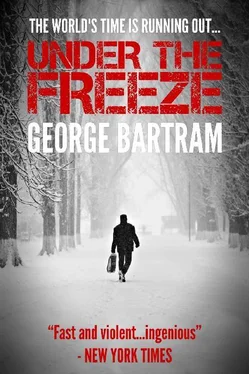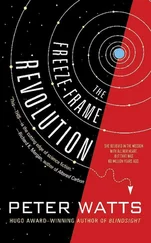“I’m not much of a signal.”
“Oh, yes.”
“I don’t work for Washington.”
“You have contacts. Come, come, we’re realists here. We think it makes better public relations if we send you back in good condition.”
Tarp pulled a tie around his neck and slipped it under the shirt collar. He almost never wore ties. “And the Mongol?”
“He gave a statement during the night.”
That “during the night” made Tarp wince. He could imagine what had gone on during the night. “What did he say?”
“He substantiated your story. Anyway Special Investigations has found the cells where you were held. One of the old blocks of the Lubyanka. They’d wiped everything down, but Forensics and Evidence found two partial fingerprints on a bed frame. Yours. And a little dried blood on the underside of a drain. Your type.”
“So there is some evidence now.”
“Oh, yes. Yes. Plenty of evidence.”
Which , in Moscow , could be a help — unless it’s decided that the truth will be different , in which case evidence is no help at all .
They walked down the corridor. They saw nobody; the staff were being kept safe from seeing him, in case there was trouble later. There was no checkout procedure, no formal discharge. “No bills,” Tarp said aloud.
“What is that?”
“Another joke.”
“Are all your American jokes about money?”
“We have lots of jokes about sex.”
“Ah, so do we. I often find them distasteful. Do you know the one about…” He told Tarp a joke that Tarp had heard when he was eleven years old.
“Yes, we have that joke, too. I find it a little distasteful.”
“Good. Then I don’t have to tell you any more sex jokes.”
They stepped outdoors to a rubber matting that covered the concrete sidewalk. Water from melting ice lay in long ribbons between the raised black ribs. The air was crisp, but the sun was shining and there seemed to be reason to believe that spring would come.
“I want to show you something,” Strisz said.
Tarp walked slowly because he was still weak. He wheezed when he breathed heavily, and his back and ribs were still sore.
They got into a car and Strisz murmured to the driver. For some minutes they rode in silence; then Strisz began to point out landmarks. Tarp realized that Strisz had a great love for Moscow and almost an expert’s knowledge of architectural history. He also had a critic’s disdain for bad architecture.
They turned into Podgornyi Street.
“Slow down at the school,” Strisz said to the driver.
The car rolled quietly past the school, from which a sound of singing came. Beyond the school, where the old house should have been, there was a new gravel play area. Nothing was left of the house — not a stick, not a chunk of brick.
“That house was built in 1887,” Strisz said.
Tarp was thinking of the old couple.
“Sometimes…” Strisz’s voice faded.
Is this a warning ? Tarp wondered.
They drove for another twenty minutes and then the car stopped outside a block of apartments whose bogus monumentality brought a caustic comment from Strisz. He leaned forward to the driver, putting a hand on Tarp’s arm to indicate that he was not to get out yet. “Get the key from the block manager,” he told the driver.
“I don’t know where the office is.”
“Find it, then. Idiot.”
Tarp and Strisz sat together in the back of the car. The windows were partway open and the air, upon which spring had laid a very light touch, smelled good.
“Mensenyi is dead,” Strisz said without looking at him. “He killed himself. I wasn’t to tell you until now. Nobody knows but the upper echelon.” He stopped talking and watched a girl walk past. “It’s a complicating factor.”
It was like being in a car on a stakeout, Tarp thought, sitting there, waiting, passing the time with talk. He had the eerie feeling that he and Strisz were partners waiting for a suspect. “When?” he said. He, too, was watching the girl.
“The night that Beranyi went to Budapest. Beranyi went to see him. We learned that afterward, of course. Mensenyi shot himself sometime that night. Actually about four in the morning, they think.” Strisz dug his hands into his overcoat pockets and slumped down on his spine. “The theory is that you told Beranyi something that suggested that Mensenyi knew too much, and so he went to Mensenyi and either killed him or forced him to kill himself. What do you think of that?”
“It could be made to make sense.”
“Did you tell Beranyi something about Mensenyi?”
“I don’t know. I was out of my head.”
“Did you think that Mensenyi was Maxudov?”
“No. Not really. But I thought he was pretty deep into some things that were going to get him into trouble. I don’t think it would have been very hard for Beranyi to scare him.”
“You think he knew something about Maxudov?”
“I think he knew a piece of something. I think he knew it without understanding it.”
Strisz crossed his legs. He was almost lying down now. “The most popular theory is that Beranyi is Maxudov and he blackmailed Mensenyi, who had helped him in some minor way — foreign contacts, maybe. Nobody liked Mensenyi. Andropov thought he was an idiot. I used to have lunch with Mensenyi sometimes. I didn’t like him, but I always found myself laughing when I was with him. We both liked jokes.” He looked at Tarp, his eyes sad and troubled. “Do you believe that Beranyi is Maxudov?”
Tarp kept looking out the window, as if the suspect for whom they were waiting would emerge from the big central doorway of the apartment block. “It’s easy to understand why the hierarchy believe that Beranyi is Maxudov.”
Strisz managed a weak grin. “You have a fine grasp of Socialist truth. Maybe you should stay in Moscow.” He wriggled into a more upright position. “It will be important to be correct in this matter.”
Tarp understood why he had had the feeling that they were partners. There was a natural sympathy between them, that temptation toward friendliness. More compelling now was their isolation from power. Strisz, Tarp sensed, was being boxed in with him by rivals in the service; whether he liked it or not he was being made Tarp’s ally. So, they were on a stakeout together. The suspect they were waiting for was truth.
He was told to write a report. The report was to show that Beranyi was Maxudov. He was not told that the report was to show that Beranyi was Maxudov, but he understood quite clearly that the official truth was taking that line. Events had gotten ahead of him: he had been brought in to investigate, and now he was expected to make the investigation conform to facts it had never discovered.
The KGB team in Hungary had determined that Beranyi had reached Lake Balaton, but the man who fished there all day had been a double. Beranyi had slipped into Austria, and Strisz reported a reliable source who had seen him at the Vienna airport.
Tarp decided to write his report so that the leadership could find its own conclusions confirmed there but to try to leave enough loose ends so that they would not feel immediately vengeful if Beranyi turned up — as Tarp believed he meant to do — with the real Maxudov in hand.
He asked for Mensenyi’s office files. It took a day to clear the request; then the files showed up with two guardians, one a female censor and the other a man who never identified himself but who was certainly from the KGB. Each paper had first to be studied by both of them and then, if it got by them, it was handed grudgingly to Tarp. He got about one paper in seven. The result was that his report was filled with words and phrases like “possibly,” “in the case that,” “if,” and “should a complete search of the files show.” In a sense, however, Soviet secrecy worked in his favor, for it became their fault and not his own that so much was conjectural.
Читать дальше












